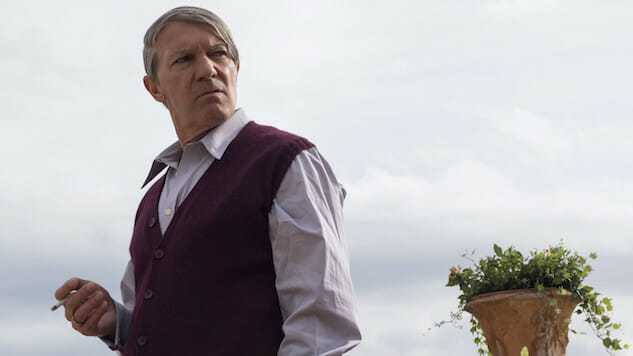For Antonio Banderas, Picasso Is Truly the Role of a Lifetime
Photo: National Geographic/Dusan Martincek
In Genius: Picasso, the second installment of National Geographic Channel’s scripted anthology series, the famed artist, played by Antonio Banderas, strikes up a flirtation with aspiring painter Françoise Gilot (Clémence Poésy). On one of her earliest visits to Picasso’s studio, in Paris, the discussion turns to the matter of inspiration, and effort, on which the aging lion offers wisdom he’s gleaned from years of experience. “The only way to be an artist is to work day and night—lose yourself in it completely,” he says, more than a little ruefully. “Do you have any idea how lonely that is?”
It isn’t possible to suss out loneliness from a crowded press event at the Tribeca Film Festival, where the network has setup a “studio” replete with installations inspired by the defining periods of Picasso’s career and digital easels for the public to toy with, but it’s clear that Banderas, 57, has thought as deeply about the subject of inspiration, and effort, as the man he calls his “idol.”
“Inspiration has to come from 8 to 8,” he says, before affecting a whine for comic effect. “There’s no way that you can say, ‘I am not working today because I’m not inspired. I don’t feel it. It’s not coming to me today, and so I’ll be back tomorrow. I’ll be at the hotel.’”
After more than 35 years in the business, including his fruitful, longtime collaboration with Spanish auteur Pedro Almodóvar, Banderas has come to appreciate Picasso’s discipline—though his working hours were unorthodox, they were also quite routinized—without glossing over the complications this caused in the artist’s personal life, which are as much the focus of the TV series as his aesthetic innovations. It’s hard not to hear a note of recognition in Banderas’ voice when he says, after being asked about the foremost lesson he learned from playing Picasso, that “really true artists suffer a big deal.”
“They don’t fit completely in the society, in the time, that they are living,” Banderas continues. “It requires a lot of sacrifices. Misunderstandings with everybody else. A tremendous amount of honesty that works beautifully when you’re doing art—but that same honesty, it provokes a lot of problems, because we all travel through life with a mask, in a way.”
The professional mask-wearer of Law of Desire, The Skin I Live In and, yes, The Mask of Zorro is far from suggesting that he’s prone to suffering, and he certainly doesn’t put on airs in the manner of an aging movie star. In fact, the actor, who was hospitalized following a heart attack in January 2017, has the sprightliness of a much younger artist: At the start of each clip shown to the press at the Tribeca event, he leaps from his chair to get a better look—driven, if his body language is any indication, by genuine fascination with the final product. Still, when the award-winning performer—and, let’s face it, international sex symbol—offers his personal synopsis of the series, there’s no doubt that Banderas understands the pressures of fame that Picasso faced.
-

-

-

-

-

-

-

-

-

-

-

-

-

-

-

-

-

-

-

-

-

-

-

-

-

-

-

-

-

-

-

-

-

-

-

-

-

-

-

-








































